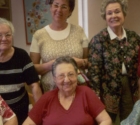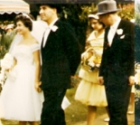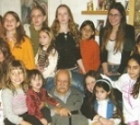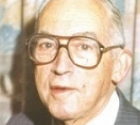
Rabbi Michael Melchior
A light unto the nations? Given what's been happening to many of our parliamentarians in recent years, the Israeli Knesset is far from that. Cynicism and self-interest are the least of it; we've also been faced with the sorry spectacle of MKs charged with crimes and even serving time in jail.
How reassuring, then, to come across one former MK who is not only above the fray, but also unafraid to voice humanitarian opinions that are opposed to what many in the religious and political establishment believe. At the same time, he's cheerful and optimistic about the future of Israel and the Jews. Now there's a change!
I met Rabbi Michael Melchior in his modest Talpiot, Jerusalem office, where only a few plaques on the wall attest to the many honors he's been awarded over the years. He's a rumpled, unpretentious man, friendly, welcoming and apologetic about running slightly late.
It's not surprising that he's late; at the age of 56, Rabbi Melchior, who comes from a seven-generation rabbinical family in Denmark and served as rabbi of the Norwegian Jewish community, packs more into one day than most people do in a week.
After coming on aliyah in 1986, Rabbi Melchior served as International Relations Director for the Elie Wiesel Foundation and in 1999, when the Meimad party was formed, became involved in politics. He was elected to the Knesset in 1999 and served in successive governments as Minister for Israeli Society and the World Jewish Community, Deputy Foreign Minister, Deputy Minister of Education and Deputy Minister in the Prime Minister's Office. Other offices he has held include Chairman of the Knesset Committee for Education, Culture and Sports and the Knesset Caucus on the Environment.
After Meimad lost its seat in the last election, Rabbi Melchior turned his focus to leading civil society movements such as Moetzet Yachad, which promotes dialogue and understanding between different strands of Israeli society; Meitarim, a network of pluralistic Jewish schools where religious and secular students learn together; the Citizen's Accord Forum, which campaigns for coexistence between Arabs and Jews; and the Mosaica Center for Interreligious Cooperation, which strives to deepen inter-religious dialogue. In addition, he was the founding chairman of the birthright steering committee, works on behalf of agunot and makes an effort to resolve problems of conversion. Wait, there's more! He is also rabbi of an Orthodox community in Jerusalem, honorary Chief Rabbi of Norway, has been mooted as the next head of the WZO and is regularly invited to speak at many forums here and abroad, including, recently, at Windsor Castle. He and his wife Hanna have five children.
So what inspires him?
Rabbi Melchior speaks of a passionate faith in the future of the Jewish people and its role both here and in the world. "I was brought up to believe in that," he says. "That is what makes me tick and enthusiastic and excited and optimistic."
His view of Judaism, though, is not exactly the same as that of more doctrinaire interpreters. "I believe in a Judaism and Zionism that bring back the balance, which I am afraid we have lost, between 'Jewish' and 'universal.' If you break that balance, either you forget to be a Jew or you forget to be a human being.
"Part of the problem is the monopoly that has been given to the religious establishment. Because it has a monopoly, it has become narrower. The danger is that we may become a sect, or several sects, rather than a nation. It's not that I want people to eat pizza on Pesach, but we should also be dealing with how we relate to 'the other'. We have censored the Torah so that we stress certain things and cut off others, such as the stricture that "you should love the stranger because you were a stranger in Egypt."
Such views don't necessarily make him very popular among many in the mainstream, as can be seen by the fact that his liberal religious Meimad party failed to pass the electoral threshold in the last elections. That doesn't disturb him. As he puts it, "Jews have never been a people of the majority. Jeremiah would not have passed a threshold either. And the good news is that 30,000 mostly young people voted for the party. Meimad did a good job, considering what a small group it was, and a lot of those ideas are now becoming part of what is generally accepted. We were the first party to talk about two States, with settlement blocs. We were also against religious legislation, because coercion doesn't make people become more Jewish."
A Jewish way of governing, in his opinion, must deal with issues such as children at risk, reconciling religious and secular in concepts like the Meitarim schools and social legislation. Most important is education. "That's the only way to create a new Jewish society and close gaps that are an embarrassment to the Jewish state."
Rabbi Melchior's fear is that Israel may be losing its relevance to young Jews around the world who have become disconnected from the Jewish state because they perceive it as a backward theocracy. "I want Israel to be relevant," he says. "I would like to see a debate about what the Jewishness of the State should actually mean. It should not just mean survival."
In spite of Israel's myriad problems, he remains hopeful. "I learned from my father that optimism is part of being a Jew. Look at my own case: I came here as an immigrant and I have had such a rich life, with the chance to do my part for the Jewish people. We all have the possibility in our time to go out there and fight for a model society of tikkun olam and to preserve something precious. To build a Jewish future."
And shouldn't that make us all more optimistic?
 LEV-RAN SCHOOL: A LOVE STORY (new)
LEV-RAN SCHOOL: A LOVE STORY (new) DEAR EDITOR 154
DEAR EDITOR 154 KNITTING CLUBS: TEL AVIV'S KNITTING & CROCHET SOCIAL CIRCLE
KNITTING CLUBS: TEL AVIV'S KNITTING & CROCHET SOCIAL CIRCLE Bridesmaid recalls a very special day 59 years ago
Bridesmaid recalls a very special day 59 years ago Harry Berman
Harry Berman Sam Levin
Sam Levin Carol Novis
Carol Novis